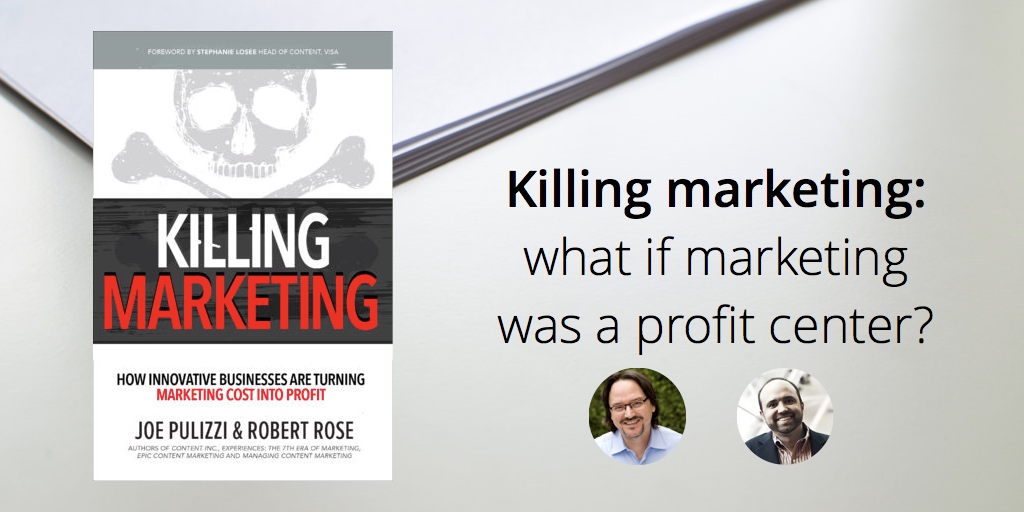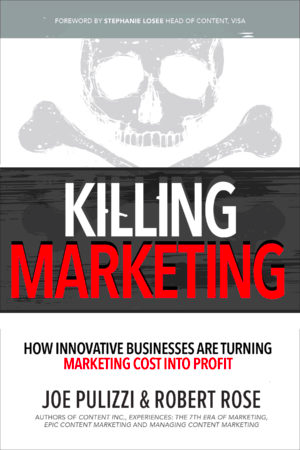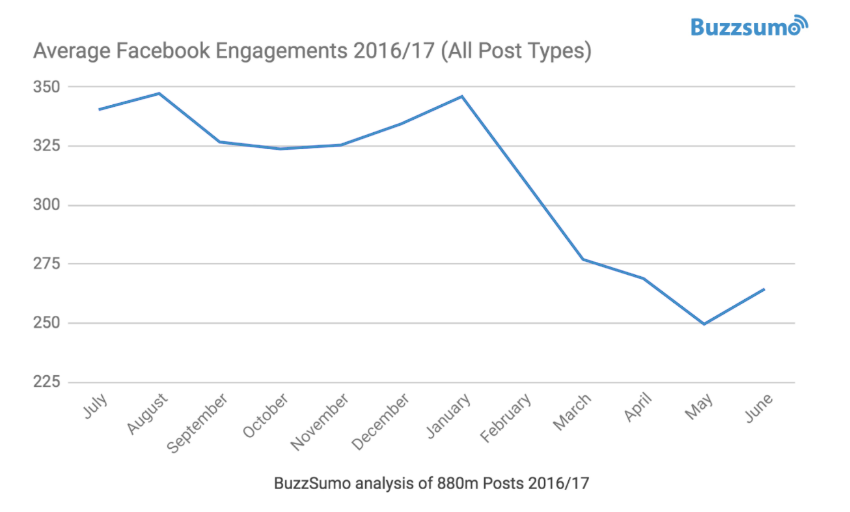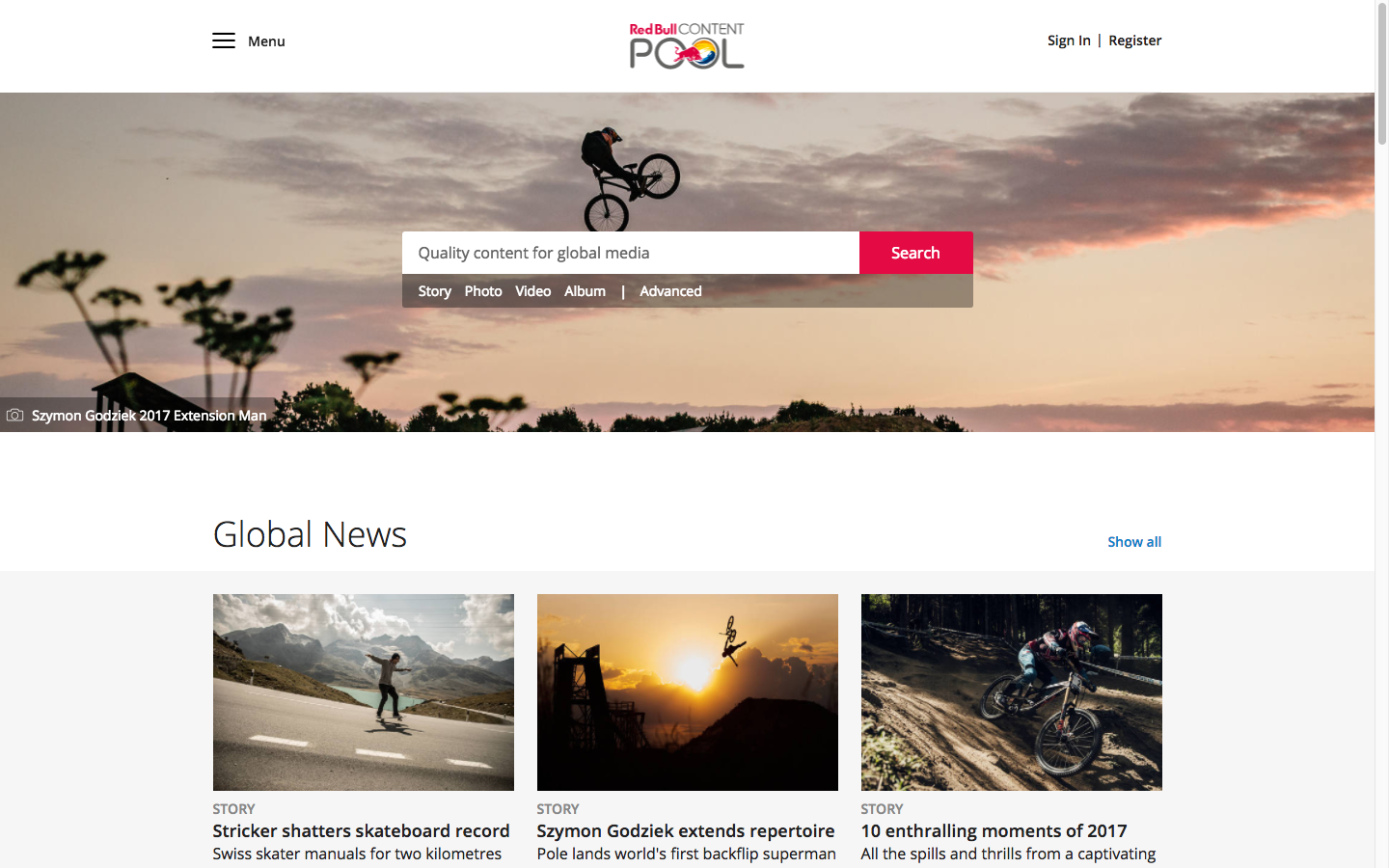
Two of the most prominent marketers in the world are coming out with a plan to… kill marketing. In their upcoming book, Content Marketing Institute’s Joe Pulizzi and Robert Rose are sharing a thought-provoking and ambitious plan for marketers to adapt or die. Behind the catchy headline, the main idea of the book is to turn marketing from a cost center to a profit center, which I’m sure many CEO’s will see as both appealing and crazy.
Joe and Robert give interesting examples though and they even tempt you with a wager not unlike Pascal’s: even if you don’t end up making marketing a profit center, there are lots of benefits in thinking down that path. If you think about making your audience the priority, they say, you can’t fail. If you think about what it means in terms of content strategy and what you can learn from building this audience, what insights you get from knowing their needs and owning the conversation, you’ll come up with great new ways to sell better as well as beneficial ideas to transform your marketing organization – if not your whole company.
The book is coming up September 19 and will be available to Content Marketing World next week (btw, if you’re going, let’s meet!). I had a chance to get an early copy and here are my first thoughts and takeaways.
Attention is a currency and it keeps trading up
Every year, we see new studies or posts that show this trend. Three years ago, I blogged about the death of social media publishing as an organic channel after Facebook had openly admitted they had started to tweak their algorithms at the detriment of brands. Mark Schaefer had coined the expression “content shock” earlier that year in one of the most controversial and brilliant post I ever read on content marketing. Two years ago, Buffer shared in their very transparent way that they had lost half of their referral traffic from social media. And if you thought we hit rock bottom, Buzzsumo just published a great study showing brand engagement on Facebook fell 20% in 2017.
Brian Solis is the first I heard talking about attention as a currency, showing the value of building an engaged audience. Well, as a currency, attention looks a lot like the Bitcoin market: it keeps getting up with no sign of fatigue.
So while growing sales has always been and will remain the goal of any company, attention is an asset. Building an audience therefore a priority.
Why audience is a different kind of core asset
Talking about capturing attention, Joe and Robert are great at making the point. Killing marketing? I don’t know. But killer headlines and titles, definitely. Their logic makes sense. If the real value in marketing nowadays is creating an audience then marketing is in the business of creating a company’s asset. And therefore should be considered a profit center.
The notion is very appealing: who doesn’t dream of making money while marketing? And it’s true that some companies like RedBull have definitely created value through content beyond selling their core product.
But is it different than looking at brands as an asset? Did we need to make marketing a profit center to realize brands could have value as an independent asset? And as a tech guy, I also think about technology as an asset for the various companies I started or worked for. But I’m not sure making R&D a profit center is justified by this. I could go on with customer service or real estate…
So the new point I believe Joe and Robert make is therefore not that any part of the organization who creates an asset should be a profit center. It’s the idea that other sources of revenue can be derived from building an audience than selling the initial products. If I read them well, I believe it’s even stronger than that: it’s the idea that you can’t generate revenue in a sustainable way if you haven’t build a solid audience first. In other words, don’t build it and they will come: build your audience first so you can learn what they want to buy.
Is every company becoming a media company?
I used to say that in my pitches back when we started. In the early days of content marketing, a lot of people didn’t get why businesses of all kinds needed to create content – let alone content that wasn’t salesy. I needed to explain the role of content in a world where customers now make their buying decisions on their own terms, based on the information they research online. The media metaphor helped.
Is it a business model though? Should companies really try to monetize the audience they build?
It can work. It certainly worked for Joe and Robert who built a solid business out of the Content Marketing institute and got acquired by UBM last year.
But does it apply to every company?
In Joe and Robert’s own admission, probably not. I can think of many cases why it can be either a distraction or something that will confuse potential customers. Embracing media company’s best practices in terms of content strategy, design and operations doesn’t mean you have to go all the way to adapt their business models.
But thinking of your next eBook as something so valuable that people would be ready to buy it is absolutely not a waste of time. And it’s actually the best way you can strategically think about your content: how can I design this piece of content so that people would possibly be ready to pay for it? Because even if you end up giving it away for free or use it as a lead magnet, you get paid for it: in a currency called… attention.
Read this book and… give a copy to your execs
So whether you’ll actually end up charging for content or monetize it directly, the idea of thinking your marketing as a profit center that gets paid in audience attention is a fantastic model. Instead of seeing marketing as a cost of doing business, companies can empower marketers to generate long-term, sustainable value. Which also comes with marketers becoming more accountable – another idea in that vein being to hold marketers to a quota.
Whether you’re not sure how to get buy-in for content marketing investment internally or you’re simply looking at thought-provoking ideas to take your content strategy to the next level, this book is a great read. It’s also a great book for your executive team to read as it articulates very well the strategic value of content, beyond tactical projects. And if I haven’t convinced you of that yet, here’s a short interview of Joe Pulizzi by my friend Bernie Borges that will give you more insights on this great topic:




